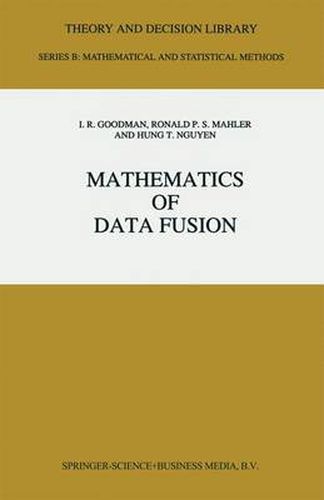Readings Newsletter
Become a Readings Member to make your shopping experience even easier.
Sign in or sign up for free!
You’re not far away from qualifying for FREE standard shipping within Australia
You’ve qualified for FREE standard shipping within Australia
The cart is loading…






This title is printed to order. This book may have been self-published. If so, we cannot guarantee the quality of the content. In the main most books will have gone through the editing process however some may not. We therefore suggest that you be aware of this before ordering this book. If in doubt check either the author or publisher’s details as we are unable to accept any returns unless they are faulty. Please contact us if you have any questions.
Data fusion or information fusion are names which have been primarily assigned to military-oriented problems. In military applications, typical data fusion problems are: multisensor, multitarget detection, object identification, tracking, threat assessment, mission assessment and mission planning, among many others. However, it is clear that the basic underlying concepts underlying such fusion procedures can often be used in nonmilitary applications as well. The purpose of this book is twofold: First, to point out present gaps in the way data fusion problems are conceptually treated. Second, to address this issue by exhibiting mathematical tools which treat combination of evidence in the presence of uncertainty in a more systematic and comprehensive way. These techniques are based essentially on two novel ideas relating to probability theory: the newly developed fields of random set theory and conditional and relational event algebra.
This volume is intended to be both an update on research progress on data fusion and an introduction to potentially powerful new techniques: fuzzy logic, random set theory, and conditional and relational event algebra.
Audience: This volume can be used as a reference book for researchers and practitioners in data fusion or expert systems theory, or for graduate students as text for a research seminar or graduate level course.
$9.00 standard shipping within Australia
FREE standard shipping within Australia for orders over $100.00
Express & International shipping calculated at checkout
This title is printed to order. This book may have been self-published. If so, we cannot guarantee the quality of the content. In the main most books will have gone through the editing process however some may not. We therefore suggest that you be aware of this before ordering this book. If in doubt check either the author or publisher’s details as we are unable to accept any returns unless they are faulty. Please contact us if you have any questions.
Data fusion or information fusion are names which have been primarily assigned to military-oriented problems. In military applications, typical data fusion problems are: multisensor, multitarget detection, object identification, tracking, threat assessment, mission assessment and mission planning, among many others. However, it is clear that the basic underlying concepts underlying such fusion procedures can often be used in nonmilitary applications as well. The purpose of this book is twofold: First, to point out present gaps in the way data fusion problems are conceptually treated. Second, to address this issue by exhibiting mathematical tools which treat combination of evidence in the presence of uncertainty in a more systematic and comprehensive way. These techniques are based essentially on two novel ideas relating to probability theory: the newly developed fields of random set theory and conditional and relational event algebra.
This volume is intended to be both an update on research progress on data fusion and an introduction to potentially powerful new techniques: fuzzy logic, random set theory, and conditional and relational event algebra.
Audience: This volume can be used as a reference book for researchers and practitioners in data fusion or expert systems theory, or for graduate students as text for a research seminar or graduate level course.